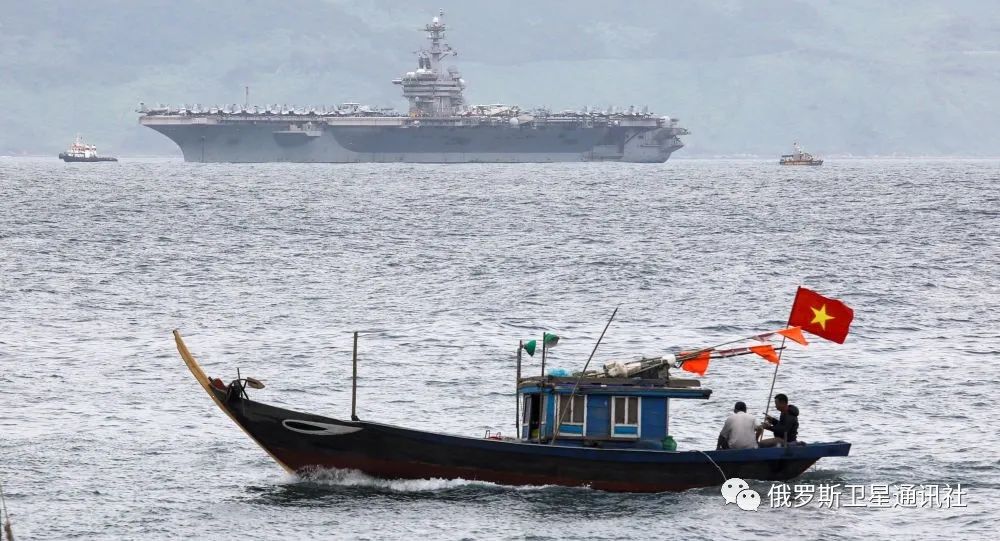
By Li Haidong
The USS Theodore Roosevelt recently arrived in Vietnam, becoming the second US aircraft carrier to visit the Southeast Asian country since 1975 (the end of Vietnam War), following the USS Carl Vinson’s visit in March 2018. Why is the US so keen on having military cooperation with Vietnam and what’s the impact?
First of all, the US, from the perspective of an all-round strategic competition against China, sees Vietnam’s role and value in its wider Indo-Pacific strategy. For this reason, the US gives particular “strategic” considerations to its relationship with Vietnam.
Over recent years, Washington has spared no effort to strangle Beijing in key domains of strategic competition and has reevaluated what role China’speripheral countries can play in this game and adjusted its policies accordingly. Hanoi is a so-called “partner” that the US hopes to win over and a key link in the regional “network of partnerships” that it tries to forge under the Indo-Pacific strategy.
After the President of the Philippines Duterte announced to terminate the Visiting Forces Agreement (VFA) with the US, Washington seems more eager to elevate Vietnam’s position as a partner. Against the background of its general strategic contraction, Washington hopes to offset China’s regional influence by intensifying disputes between China and its peripheral countries, or the so-called American partners, including Vietnam.
Washington finds this to be a cost-effective approach. On the one hand, by placing obstacles, the US avoids any direct military conflict with China while on the other hand, it reaches the goal of weakening or disrupting China’s pace of development at the cost of wearing off or even sacrificing the American partners.
Second, elevating US-Vietnam military ties doesn’t change the inherent feature of “reforming other countries” in American diplomacy. That is the intrinsic drive for Washington to tighten its connections with socialist countries, so that it can reform or even subvert them.
The US always harbors the “impulse” to fundamentally transform Vietnam’s socialist political system. The fiasco it suffered over the 20th century, vainly attempting to transform the Southeast Asian country through a war, has always been a thorn in the flesh for America’s political elites. Now that, under the new circumstances in which Washington gets an appetite to deepen the cooperative relation with Hanoi by creating a common enemy, its urge to transform the country will come back too, which will push it to escalate the evolution on various layers of the Vietnamese society in ways other than war.
The US has been assisting Vietnam in enhancingthe military strength in recent years, not only lifting weapon embargoes, but also providing Vietnamwith fleet of patrol vessels. With the strengthened security cooperation comes more intense measures to reform Vietnam’s political and economic systems. Vietnam will have its judgment on whether this kind of American security outlook is a bane or boon for it.
Third, although countries in Southeast Asia are divergent over the South China Sea, all related parties have strengthened communication and consultation and worked together to mitigate their conflicts in a constructive way following the thought of building a regional community.
In this case, however, the US has tried to justify its initiative of strengthening the relationship with Vietnam and other countries by sending warships to the South China Sea, exposing its consistent mindset of resolving regional issues through military confrontation. Misguided by such a way of thinking, America’s Middle East and Afghanistan policies have proven to be such a complete failure, which has left its allies or partners either severely shattered or sacrificed, and the US itself deeply divided inside. Yet instead of learning a lesson, the US has decided to apply the same approach to countries in the South China Sea.
Respecting the sovereignty and territorial integrity of every nation remains the key code of conduct in today’s international community. America’s attempt to ignore China’s sovereignty and instigate Vietnam to challenge China’s territorial integrity will lead to regional disorder and eventually damage the interests of the US and Vietnam themselves. Washington believes such a disorderly situation will make itself indispensable in restoring regional order, but that doesn’t serve the interests of Vietnam and other related countries at all.
Intensified US-Vietnam military connection will be a normal phenomenon, but the closer military relation, as demonstrated by the US aircraft carrier’s visit to Vietnam, won’t change the latter’s cooperative policy toward China. With mutual trust between their political parties, close economic ties and the common goal of regional integration, Hanoi and Beijing will be able to fend off any adverse effect on their stable bilateral relation exerted by any third party.
The rally of more American troops in the West Pacific will aggravate the military competition between China and the US, but it won’t disrupt the process of closer integration between China and regional countries, nor will it be likely that the China-US relation gets totally “out of control”.
(The author is a professor at the Institute of International Relations at China Foreign Affairs University)













